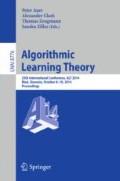Abstract
We introduce and explore a model for parallel learning of families of languages computable by finite automata. In this model, an algorithmic or automatic learner takes on n different input languages and identifies at least m of them correctly. For finite parallel learning, for large enough families, we establish a full characterization of learnability in terms of characteristic samples of languages. Based on this characterization, we show that it is the difference n − m, the number of languages which are potentially not identified, which is crucial. Similar results are obtained also for parallel learning in the limit. We consider also parallel finite learnability by finite automata and obtain some partial results. A number of problems for automatic variant of parallel learning remain open.
Access this chapter
Tax calculation will be finalised at checkout
Purchases are for personal use only
Preview
Unable to display preview. Download preview PDF.
References
Austinat, H., Diekert, V., Hertrampf, U., Petersen, H.: Regular frequency computations. Theoretical Computer Science 330, 15–20 (2005)
Angluin, D., Gasarch, W., Smith, C.: Training sequences. Theoretical Computer Science 66, 255–272 (1989)
Angluin, D.: Inductive inference of formal languages from positive data. Information and Control 45, 117–135 (1980)
Blumensath, A., Grädel, E.: Automatic structures. In: 15th Annual IEEE Symposium on Logic in Computer Science (LICS), pp. 51–62. IEEE Computer Society (2000)
Biegel, R., Gasarch, W., Kinber, E.: Frequency computation and bounded queries. Theoretical Computer Science 163, 177–192 (1996)
Balodis, K., Kucevalovs, I., Freivalds, R.: Frequency prediction of functions. In: Kotásek, Z., Bouda, J., Černá, I., Sekanina, L., Vojnar, T., Antoš, D. (eds.) MEMICS 2011. LNCS, vol. 7119, pp. 76–83. Springer, Heidelberg (2012)
Gold, E.M.: Language identification in the limit. Information and Control 10(5), 447–474 (1967)
Jain, S., Luo, Q., Stephan, F.: Learnability of automatic classes. Journal of Computer and System Sciences 78(6), 1910–1927 (2012)
Jain, S., Osherson, D., Royer, J., Sharma, A.: Systems that Learn: An Introduction to Learning Theory, 2nd edn. MIT Press, Cambridge (1999)
Kinber, E.: Frequency computations in finite automata. Kibernetika 2, 7–15 (1976) (in Russian); English translation in Cybernetics 12, 179–187
Khoussainov, B., Nerode, A.: Automatic presentations of structures. In: Leivant, D. (ed.) LCC 1994. LNCS, vol. 960, pp. 367–392. Springer, Heidelberg (1995)
Kinber, E., Smith, C., Velauthapillai, M., Wiehagen, R.: On learning multiple concepts in parallel. Journal of Computer and System Sciences 50, 41–52 (1995)
Lange, S., Zeugmann, T.: Language learning in dependence on the space of hypotheses. In: Proceedings of the Sixth Annual Conference on Computational Learning Theory, pp. 127–136. ACM Press (1993)
Mukouchi, Y.: Characterization of finite identification. In: Jantke, K.P. (ed.) AII 1992. LNCS, vol. 642, pp. 260–267. Springer, Heidelberg (1992)
Papadimitriou, C.H.S., Steiglitz, K.: Combinatorial Optimization: Algorithms and Complexity. Dover (1998)
Pitt, L.: Probabilistic inductive inference. Journal of the ACM 36, 383–433 (1989)
Rose, G.: An extended notion of computability. Abstracts of International Congress for Logic, Methodology and Philosophy of Science, p. 14 (1960)
Smith, C.: The power of pluralism for automatic program synthesis. Journal of the ACM 29, 1144–1165 (1982)
Trakhtenbrot, B.: On the frequency of computation of functions. Algebra i Logika 2, 25–32 (1964)
Wiehagen, R., Freivalds, R., Kinber, E.: On the power of probabilistic strategies in inductive inference. Theoretical Computer Science 28, 111–133 (1984)
Author information
Authors and Affiliations
Editor information
Editors and Affiliations
Rights and permissions
Copyright information
© 2014 Springer International Publishing Switzerland
About this paper
Cite this paper
Jain, S., Kinber, E. (2014). Parallel Learning of Automatic Classes of Languages. In: Auer, P., Clark, A., Zeugmann, T., Zilles, S. (eds) Algorithmic Learning Theory. ALT 2014. Lecture Notes in Computer Science(), vol 8776. Springer, Cham. https://doi.org/10.1007/978-3-319-11662-4_6
Download citation
DOI: https://doi.org/10.1007/978-3-319-11662-4_6
Publisher Name: Springer, Cham
Print ISBN: 978-3-319-11661-7
Online ISBN: 978-3-319-11662-4
eBook Packages: Computer ScienceComputer Science (R0)

